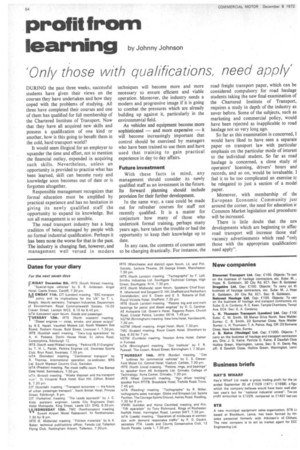profit from
Page 56

If you've noticed an error in this article please click here to report it so we can fix it.
learning by Johnny Johnson
'Only those with qualifications, need apply'
DURING the past three weeks, successful students have given their views on the courses they have undertaken and how they coped with the problems of studying. All three have completed their courses and one of them has qualified for full membership of the Chartered Institute of Transport. Now that they have all acquired new skills and possess a qualification of one kind or another, how is this going to benefit them in the cold, hard transport world?
It would seem illogical for an employer to squander the time and effort, not to mention the financial outlay, expended in acquiring such skills. Nevertheless, unless an opportunity is provided to practise what has been learned, skill can become rusty and knowledge soon becomes out of date or is forgotten altogether.
Responsible management recognizes that formal education must be amplified by practical experience and has no hesitation in giving its newly qualified staff the opportunity to expand its knowledge. But not all management is so sensible.
The road transport industry has a long tradition of being managed by people with no formal industrial qualification. Perhaps it has been none the worse for that in the past. The industry is changing fast, however, and management well versed in modern techniques will become more and more necessary to ensure efficient and viable operation. Moreover, the industry needs a modern and progressive image if it is going to combat the pressures which are already building up against it, particularly in the environmental field.
As vehicles and equipment become more sophisticated and more expensive it will become increasingly important that control should be exercised by managers who have been trained to use them and have used that training to gain practical experience in day to day affairs.
Future investment With these facts in mind, any management should consider its newly qualified staff as an investment in the future. Its forward planning should include provision for their further development.
In the same way, a case could be made out for refresher courses for staff not recently qualified. It is a matter for conjecture how many of those who undertook formal training, perhaps many years ago, have taken the trouble or had the opportunity to keep their knowledge up to date.
In any case, the contents of courses seem to be changing drastically. For instance, the road freight transport paper, which can be considered compulsory for road haulage students taking the new final examination of the Chartered Institute of Transport, requires a study in depth of the industry as never before. Some of the subjects, such as marketing and commercial policy, would have been rejected as inapplicable to road haulage not so very long ago.
So far as this examination is concerned, I would have liked to have seen a separate paper on transport law with particular emphasis on the particular mode of interest to the individual student. So far as road haulage is concerned, a close study of operators' licensing, drivers' hours and records, and so on, would be invaluable. feel it to be too complicated an exercise tc be relegated to just a section of a mode paper.
Moreover, with membership of thc European Economic Community just around the corner, the need for education ir Common Market legislation and proceduref will be increased.
There is little doubt that the nem developments which are beginning to affec road transport will increase those staf vacancy advertisements which read "on13 those with the appropriate qualification; need apply".








































































































